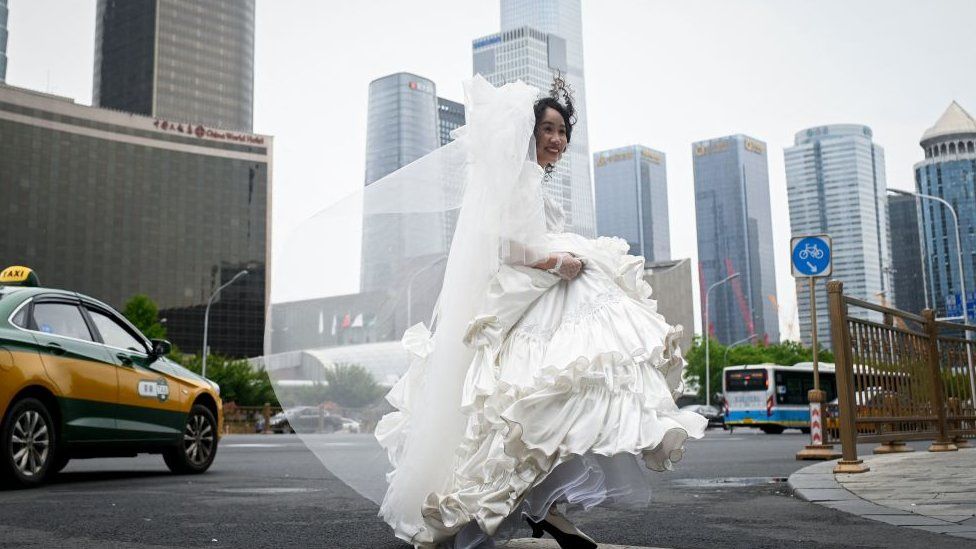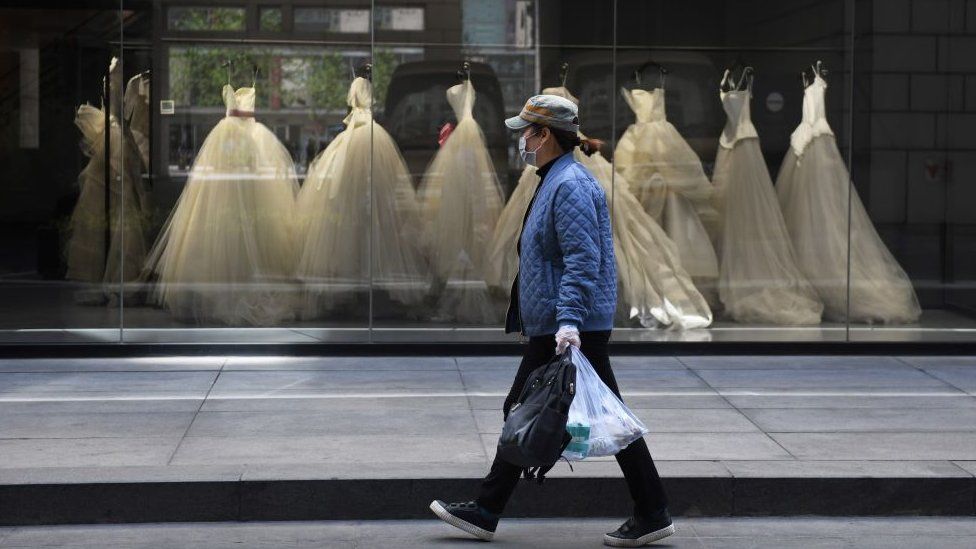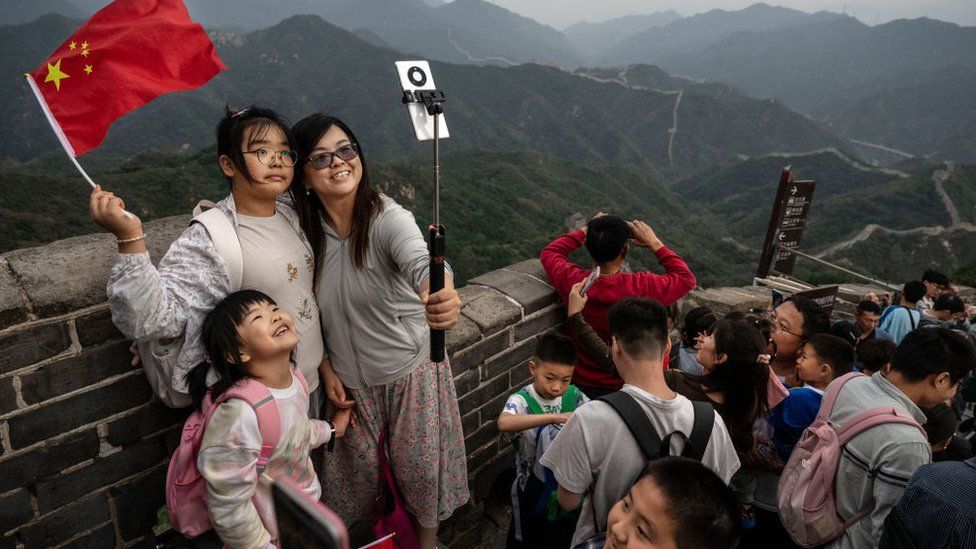www.bbc.com
 Image source, Getty Images
Image source, Getty Images
Image caption,
Young Chinese are turning away from traditional choices like marriage and children
Chen has been on more than 20 blind dates, all set up by her mother.
Some of the dates have been worse than others, she says, because she has a condition that most men she meets seem unable to accept - she doesn't want children.
"Having babies is very tiring and I don't like babies," says Chen, who's in her late 20s and only wanted to share her last name. "But it's impossible to find a man who doesn't want children. For a man not to have children… It's like killing him."
Despite the string of unsuccessful dates, the pressure to marry has not eased. It's making her nearly "explode", she says.
It is not just Chen's parents who want her to marry and have children. As marriage and birth rates plummet, the Chinese Communist Party is encouraging millions of young women and men to reverse the trend.
Last year, China's population fell for the first time in 60 years, and its fertility rate dropped to a record low. The number of registered marriages, too, hasn't been this low - 6.83 million - since 1986.
Disheartened by a slowing economy and rising unemployment, young Chinese are also turning away from the traditional choices their parents made. The result is a headache for the Party and far from the "national rejuvenation" the country's leader Xi Jinping has called for.
It's not that Chinese officials have not been trying.
Across the country, bureaucrats have been mobilised to incentivise young people to get married, and for couples to stay married and have children.
Earlier this year, a small town in the eastern Zhejiang province announced that it would offer couples 1,000 yuan ($137; £108) as a "reward" if the bride was 25 years or younger. It stunned and then angered locals, who called the local government tone-deaf for assuming that such a small amount of money could have an impact on such a major decision.
Elsewhere, officials insisted on a "30-day cooling-off period" for couples seeking separation or divorce. This led to concerns about how this would restrict personal choices, and harm women who face domestic violence.
 Image source, Getty Images
Image source, Getty Images
Image caption,
The number of marriages in China dropped last year to their lowest since records began
In rural areas, where more and more single men are struggling to find a bride, authorities have ordered women to stop asking for high bride prices.
Like other "incentives", this one won't work either, says economist Li Jingkui.
Even without bride prices, men are still competing for a bride, he says. "There could be other ways to compete: like houses, cars or just better looks."
Experts say the overwhelmingly male Chinese leadership cannot possibly understand what's driving these choices for young people, especially women.
The efforts of these men, and all the men below them, are often seen as out-of-touch and even superficial, often attracting ridicule online.
"The officials in the government basically all have wives," says Mr Li. "They don't get this pain."
Experts believe China's singles population is made up of two unmatchable groups - urban women and rural men.
Rural men are battling economic expectations, such as high bride prices and a secure job that can support a family. And this, in turn, seems to be empowering women in rural areas to take more time in choosing a partner.
"When I went home for Chinese New Year, I felt awesome being a woman in rural China's marriage market," says 28-year-old Cathy Tian who works in Shanghai.
She says she was worried she would be considered "a bit old" in northern Anhui province, where women usually get married by the time they turn 22. But she found the opposite to be true.
"I don't need to provide anything but the man needs to have a house, a car, an engagement ceremony as well as pay a bride price. I felt like I'm at the top of this marriage market."
 Image source, Getty Images
Image source, Getty Images
Image caption,
Young women say having a child is no longer a task - it's a choice
Urban women, on the other hand, say what troubles them is the widening gap between how they view marriage, and how the rest of society views it.
"There is no anxiety inside of me," says Chen. "My anxiety comes from outside."
Unlike her parents' generation, when life was a challenge and love was a luxury, people and women have more options now, she says.
"Our idea now is it's okay to not have babies, and it's no longer a task we must complete."
Women also note that like the world around them, the government's campaigns focus on women and overlook men's responsibilities as partners.
And the unequal expectations are driving them away from the idea of becoming a parent.
Chen says this is also part of the reason she doesn't want children - watching her friend be a parent. "Her second child is very naughty. I really feel that every time I go to her house, it will explode and the ceiling will be torn down."
 Image source, Getty Images
Image source, Getty Images
Image caption,
Young unmarried women say they fear the unequal burden of parenting
In China, "raising your kids as if your spouse has died" has become a common phrase among young mothers. It means husbands are not doing chores or sharing the job of being a parent.
"All the married men I know think their responsibility in the family is just to earn money," says a 33-year-old data scientist who did not want to reveal her name.
"Mothers feel guilty for not being with their children, they even think it's not alright to stay out late. But the fathers never have such guilt."
But the Party has shown no indication that inequality and changing expectations are among the challenges they must counter to lift marriage or birth rates.
And young Chinese are making it clear that they will not be wooed so easily by officials.
When talking about the social pressures they face, they often repeat a slogan popularised during Shanghai's crippling and controversial Covid lockdown.
They were words used by a young man arguing with officials against tough restrictions: "We are the last generation."
China's matchmaking mums have a powerful ally: The Party

Image caption,
Young Chinese are turning away from traditional choices like marriage and children
Chen has been on more than 20 blind dates, all set up by her mother.
Some of the dates have been worse than others, she says, because she has a condition that most men she meets seem unable to accept - she doesn't want children.
"Having babies is very tiring and I don't like babies," says Chen, who's in her late 20s and only wanted to share her last name. "But it's impossible to find a man who doesn't want children. For a man not to have children… It's like killing him."
Despite the string of unsuccessful dates, the pressure to marry has not eased. It's making her nearly "explode", she says.
It is not just Chen's parents who want her to marry and have children. As marriage and birth rates plummet, the Chinese Communist Party is encouraging millions of young women and men to reverse the trend.
Last year, China's population fell for the first time in 60 years, and its fertility rate dropped to a record low. The number of registered marriages, too, hasn't been this low - 6.83 million - since 1986.
Disheartened by a slowing economy and rising unemployment, young Chinese are also turning away from the traditional choices their parents made. The result is a headache for the Party and far from the "national rejuvenation" the country's leader Xi Jinping has called for.
Officials 'don't get the pain'
The concern has reached Mr Xi, who recently gave a speech on the need to "cultivate a new culture of marriage and childbearing". He also spoke of "strengthening guidance" to shape young people's view on marriage, children and family.It's not that Chinese officials have not been trying.
Across the country, bureaucrats have been mobilised to incentivise young people to get married, and for couples to stay married and have children.
Earlier this year, a small town in the eastern Zhejiang province announced that it would offer couples 1,000 yuan ($137; £108) as a "reward" if the bride was 25 years or younger. It stunned and then angered locals, who called the local government tone-deaf for assuming that such a small amount of money could have an impact on such a major decision.
Elsewhere, officials insisted on a "30-day cooling-off period" for couples seeking separation or divorce. This led to concerns about how this would restrict personal choices, and harm women who face domestic violence.

Image caption,
The number of marriages in China dropped last year to their lowest since records began
In rural areas, where more and more single men are struggling to find a bride, authorities have ordered women to stop asking for high bride prices.
Like other "incentives", this one won't work either, says economist Li Jingkui.
Even without bride prices, men are still competing for a bride, he says. "There could be other ways to compete: like houses, cars or just better looks."
Experts say the overwhelmingly male Chinese leadership cannot possibly understand what's driving these choices for young people, especially women.
- What it will mean when Indians outnumber Chinese
- Burnt out or jobless - meet China's 'full-time children'
The efforts of these men, and all the men below them, are often seen as out-of-touch and even superficial, often attracting ridicule online.
"The officials in the government basically all have wives," says Mr Li. "They don't get this pain."
Experts believe China's singles population is made up of two unmatchable groups - urban women and rural men.
Rural men are battling economic expectations, such as high bride prices and a secure job that can support a family. And this, in turn, seems to be empowering women in rural areas to take more time in choosing a partner.
"When I went home for Chinese New Year, I felt awesome being a woman in rural China's marriage market," says 28-year-old Cathy Tian who works in Shanghai.
She says she was worried she would be considered "a bit old" in northern Anhui province, where women usually get married by the time they turn 22. But she found the opposite to be true.
"I don't need to provide anything but the man needs to have a house, a car, an engagement ceremony as well as pay a bride price. I felt like I'm at the top of this marriage market."

Image caption,
Young women say having a child is no longer a task - it's a choice
Urban women, on the other hand, say what troubles them is the widening gap between how they view marriage, and how the rest of society views it.
"There is no anxiety inside of me," says Chen. "My anxiety comes from outside."
Unlike her parents' generation, when life was a challenge and love was a luxury, people and women have more options now, she says.
"Our idea now is it's okay to not have babies, and it's no longer a task we must complete."
Women also note that like the world around them, the government's campaigns focus on women and overlook men's responsibilities as partners.
And the unequal expectations are driving them away from the idea of becoming a parent.
Chen says this is also part of the reason she doesn't want children - watching her friend be a parent. "Her second child is very naughty. I really feel that every time I go to her house, it will explode and the ceiling will be torn down."

Image caption,
Young unmarried women say they fear the unequal burden of parenting
In China, "raising your kids as if your spouse has died" has become a common phrase among young mothers. It means husbands are not doing chores or sharing the job of being a parent.
"All the married men I know think their responsibility in the family is just to earn money," says a 33-year-old data scientist who did not want to reveal her name.
"Mothers feel guilty for not being with their children, they even think it's not alright to stay out late. But the fathers never have such guilt."
But the Party has shown no indication that inequality and changing expectations are among the challenges they must counter to lift marriage or birth rates.
And young Chinese are making it clear that they will not be wooed so easily by officials.
When talking about the social pressures they face, they often repeat a slogan popularised during Shanghai's crippling and controversial Covid lockdown.
They were words used by a young man arguing with officials against tough restrictions: "We are the last generation."
